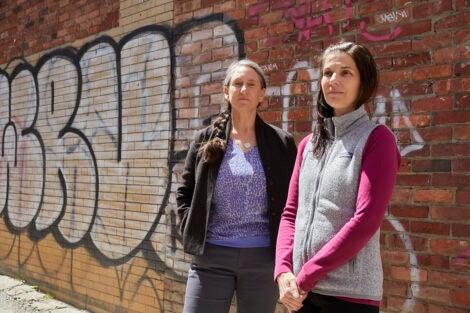June 15, 2022 – People experiencing homelessness face innumerable challenges in achieving any sense of health. They endure a host of difficulties in managing chronic diseases—including extreme poverty, unstable housing, and even stolen medications—while not having any assurance of timely or compassionate care for acute illnesses and injuries. They have substantially heightened risks of communicable diseases and violence. And they face substantial stigma and discrimination in their daily lives. Yet only a handful of schools of public health focus dedicated attention on this increasingly visible and vulnerable population. Few schools offer a dedicated course on the topic.
In response to these challenges, Harvard T.H. Chan School of Public Health launched a course two years ago called Homelessness and Health: Lessons from Health Care, Public Health, and Research. It’s one of many pieces of Harvard Chan School’s new pilot Initiative on Health and Homelessness (IHH), an effort aimed at advancing education, research, and practice regarding housing instability’s devastating impacts on health.
Howard Koh, Harvey V. Fineberg Professor of the Practice of Public Health Leadership and faculty chair of IHH, thinks that public health students should learn the basics about the interdisciplinary challenges of homelessness. He also hopes that some, if not many, can contribute to research and effective policies.
“Homelessness is a complex and seemingly intractable social crisis in urgent need of comprehensive solutions,” said Koh. “It is deeply entwined with broader issues of poverty, social disparities, education and discrimination. Obstacles block people from accessing integrated medical, mental health, and substance use disorder care. The goal of IHH is to build an academic community that begins to address the neglected world of health and homelessness through education, research, and translation.”
In addition to the course, IHH also provides pilot support for research by doctoral students and faculty members, explores opportunities for research collaborations with experts and organizations across the country, hosts monthly seminars with local and national leaders, and produces a monthly newsletter.
The instructors of the course on homelessness—Maggie Sullivan, an instructor and fellow at the François-Xavier Bagnoud (FXB) Center for Health and Human Rights at Harvard University, and Jill Roncarati, an instructor in the Office of Education—have both seen the problems firsthand. Both received their doctorates from Harvard Chan School, and each has spent a decade as a medical provider at the Boston Health Care for the Homeless Program (BHCHP), which cares for more than 11,000 homeless individuals each year.
Sullivan noted that very few health care professionals start their careers aspiring to work specifically with homeless populations. “But I do think it’s underestimated how often health professionals take care of people experiencing homelessness, many times without knowing it,” she said. “As a new nurse practitioner, I didn’t think I would be taking care of people experiencing homelessness. But lo and behold, at a community health center for immigrant families, I was taking care of several people who were unhoused, though I didn’t know it at first. That’s why I think it’s important that we educate ourselves about it. We won’t be able to positively impact patient health experiences and outcomes if we don’t explicitly address their housing status.”
The course covers a range of topics, including demographic trends, how structural racism impacts homelessness, the landscape of homeless programs in the U.S., and homelessness among groups such as veterans, populations with limited proficiency in English, families, and children. The course also features guest speakers, including leaders in the field as well as people who have lived experience with homelessness.
One week of the course is spent examining two case studies, specially written for IHH, that offers a detailed look at how BHCHP managed health care for Boston’s homeless population in response to the COVID-19 pandemic. Efforts included ramping up telehealth, redeploying staff, and creating a large field hospital during a time of great need.
Students in the class have come from across Harvard, including from the Graduate School of Design, Harvard Kennedy School, and Harvard Medical School; undergraduates have also taken the course. Roncarati and Sullivan said that the different perspectives of students have enriched class discussions. “It seems there’s never enough time for discussion, which is great,” Sullivan said. “There are always more questions and more conversations that people want to have.”
Roncarati hopes that students leave the class with a better understanding that people experiencing homelessness represents a heterogeneous population—“a whole bunch of different folks from different walks of life,” she said.
“It’s possible to end homelessness if we all work together,” she added. “We got here through a very complex chain of events. And we can all be part of the answer.”
photo: Kent Dayton
